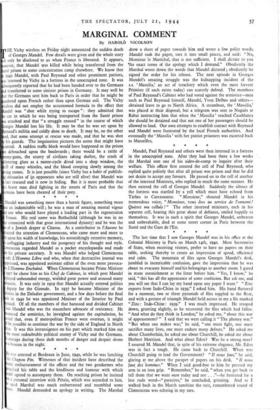The last time that I saw Georges Mandel was in
his office at the Colonial Ministry in Paris on March 14th, 1940. Most Secretaries of State, when receiving visitors, prefer to have no papers on their table, seeking thereby to create an impression of speed, efficiency and calm. The mountain of files upon Georges Mandel's desk, jumbled in inextricable confusion, gave the impression that he was about to evacuate himself and his belongings to another room. I gazed in mute astonishment at the litter before him. " Yes, I know," he said, " this has all the appearance of some confusion. But ask me, and you will see that I can lay my hand upon any paper I want." " Zinc exports from Indo-China in 1939," I asked him. His hand fluttered for a moment, two or three pyramids of files toppled to the floor, and with a gesture of triumph Mandel held across to me a file marked " Zinc: Indo-Chine: 1939." I was much impressed. He stooped down, grunting slightly, as he recovered the files which had fallen. "And what do they think in London," he asked me, "about this war of appeasement? " I said that we were calling it " The phoney war." " But when one makes war," he said, " one must fight, one must sacrifice many lives, one must endure many defeats." He asked me about Chamberlain, he asked me about Churchill, he asked me about Herbert Morrison. And what about Eden? Was he a strong man? I assured M. Mandel that, in spite of his extreme elegance, Mr. Eden was in fact a tough. He came back to Churchill. When was Churchill going to lead the Government? "Il nous Taut," he said, glaring at me .above the parapet of papers on his desk. "II nous Put des hommes." When I said good-bye to him he pressed my arm in an iron grip. " Remember," he said, " when you get back to tell them that we want men today and not . . ."—he hesitated for a less rude word—" parasites," he concluded, grinning. And as I. walked back in the March sunshine the vast, remembered sound of Clemenceau was echoing in my ears.






















 Previous page
Previous page